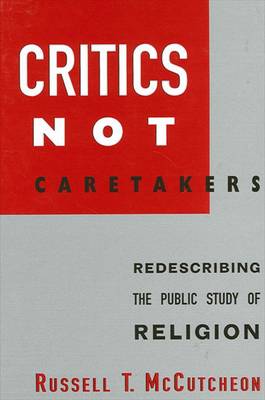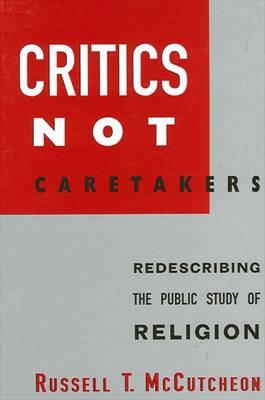
- Afhalen na 1 uur in een winkel met voorraad
- Gratis thuislevering in België vanaf € 30
- Ruim aanbod met 7 miljoen producten
- Afhalen na 1 uur in een winkel met voorraad
- Gratis thuislevering in België vanaf € 30
- Ruim aanbod met 7 miljoen producten
Zoeken
€ 42,95
+ 85 punten
Omschrijving
Critics Not Caretakers argues that the study of religion must be rethought as an ordinary aspect of social, historical existence, a stance that makes the scholar of religion a critic of cultural practices rather than a caretaker of religious tradition or a font of timeless wisdom. From a general introduction written for a wide audience and a theoretical essay that outlines the basis of an alternative, socio-rhetorical approach to studying religion, the book moves on to a series of dispatches from the theory wars, each of which uses the work of such writers as Karen Armstrong, Walter Burkert, and Benson Saler as a point of entry into wider theoretical issues of importance to the field's future. The author then examines the socio-political role of this brand of critical scholarship--a role that differs dramatically from the type of sympathetic caretaking generally associated with scholars of religion who feel compelled to "go public." Concluding the work is a consideration of how scholars as teachers can address issues of theory and critical thinking in the undergraduate classroom. Written with verve, Critics Not Caretakers provides a viable alternative for all those dissatisfied with the covertly political, liberal humanist approach that currently dominates the study of religion.
Specificaties
Betrokkenen
- Auteur(s):
- Uitgeverij:
Inhoud
- Aantal bladzijden:
- 296
- Taal:
- Engels
- Reeks:
Eigenschappen
- Productcode (EAN):
- 9780791449448
- Verschijningsdatum:
- 29/03/2001
- Uitvoering:
- Paperback
- Formaat:
- Trade paperback (VS)
- Afmetingen:
- 152 mm x 229 mm
- Gewicht:
- 399 g

Alleen bij Standaard Boekhandel
+ 85 punten op je klantenkaart van Standaard Boekhandel
Beoordelingen
We publiceren alleen reviews die voldoen aan de voorwaarden voor reviews. Bekijk onze voorwaarden voor reviews.











